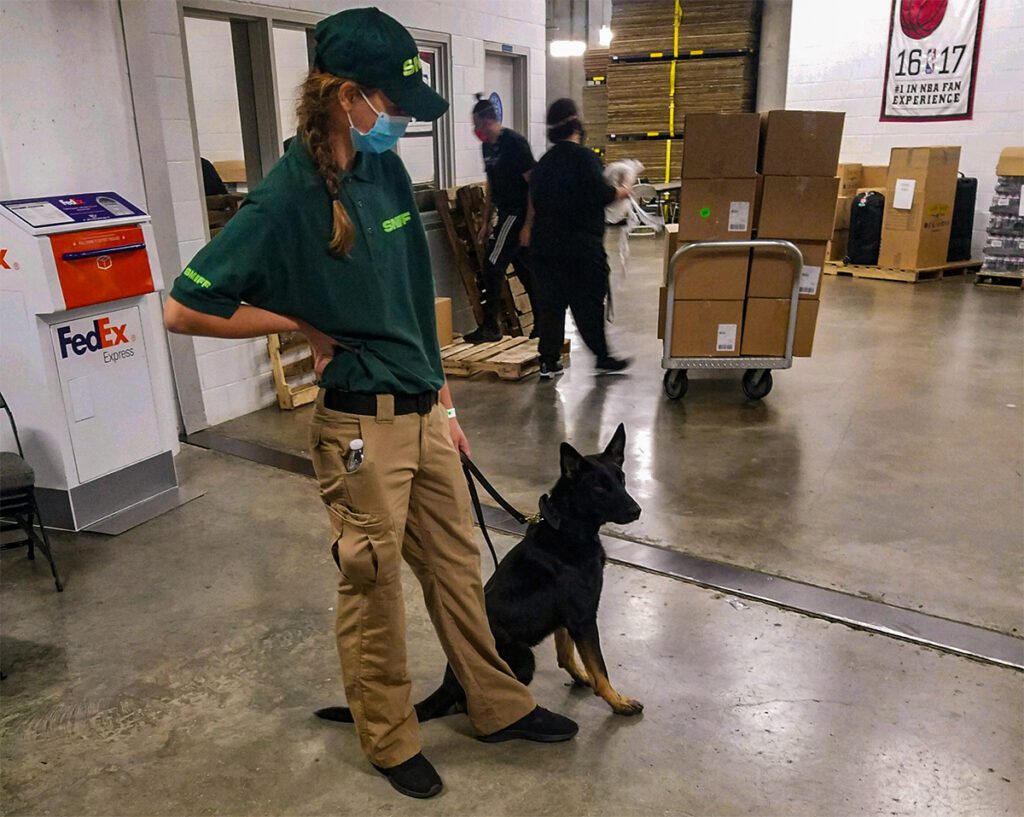Central Florida Company Trains Canines to Detect Virus
by JULIE GMITTER
In 2020, many people adapted to the changing health crisis — whether it meant conducting business differently, working from home or virtual learning with their kids. F1K9, a Central Florida canine scent detection training school, is one of many businesses refocusing their efforts in light of the pandemic. The company trains canines to detect agricultural diseases, among other things. Now, it is training canines to focus on a different target: SARS COV-2, the strain of coronavirus that causes coronavirus disease 2019 (COVID-19).
Bill Schneider, chief research scientist at F1K9, explains that all their dogs are specifically bred for scent detection and usually of the German shepherd or Belgian Malinois breed. Dogs with long noses and high scent drives are ideal breeds for scent detection training. The first agricultural disease detection canine at F1K9 was a black lab named Juice who was trained to detect citrus canker. Dogs being trained to detect SARS COV-2 take eight weeks to be validated; additional time is then required for the canines to be authorized to work on human beings. But the whole process takes no more than 10 weeks total for the complete training. With no need for reagents or kits, canines are an ideal resource for efficient and effective testing.
Canine scent detection training works like a behavioral reward system. The canines are rewarded when they alert the trainer to the target scent. Once the canine alerts the trainer to the presence of the target scent with a particular behavior, such as sitting, they are rewarded.
Schneider and others at F1K9 began discussing the prospect of training the canines in March when COVID-19 cases began the initial rise in the United States. In the initial stages, there were plenty of tests, but they sometimes produced inconsistent results. Because F1K9 had so much success using canines for agricultural diseases, they had a hunch this could be a good opportunity for them. Then, a group from New York contacted them and asked about investing in COVID detection and fronted money to fund their training; the program is called SNIFF. After that, F1K9 purchased four dogs and started training them in August. They learned to find the scent of the virus by the end of September. They then started clinical sample validation in October using masks and clothing items of confirmed COVID positive patients. They progressed to human validation in mid-October in Jacksonville. In both scenarios, all of the dogs were 95-99% accurate at detecting SARS COV2.
Once the dogs satisfied that requirement, they began to team up on a pilot project with the Miami Heat to use their canines to detect COVID-19 at arenas for sports events. The dogs can screen people in about 10 seconds, making it a fast and safe way to help screen patrons at events. Even the thermometers used to screen people upon entry have inconsistencies, meaning canines are the fastest and most accurate screening tool. Most importantly, the canines are more accurate at detecting asymptomatic infections, which are most insidious at a large event, and so faster than the PCR method.
The handlers follow CDC guidelines of wearing PPE and masks and maintaining social distance. As for any risks to the canines used for scent detection of active coronavirus infections, Schneider explains: “About 17 dogs have been confirmed to have had COVID-19, through PCR positive results, and none of those dogs are the breeds we use. There may be some genetic component or blood type that protects the dogs, as we have heard about certain blood types potentially working to protect some humans from infection, but we don’t know. These dogs also only encounter people 10 seconds at a time. And risk is a function of time exposure. They are checked very regularly but we don’t anticipate that it will be riskier than people that already own dogs.”
Despite what happens with vaccines and the future COVID-19, the ability for canines to detect coronavirus infections is a step toward finding safe ways for people to participate in activities again.
